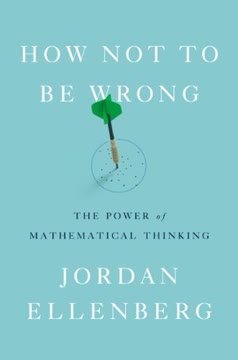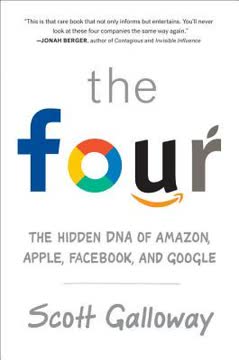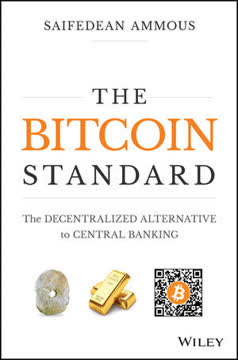Key Takeaways
1. Bitcoin: The Internet of Money revolutionizing trust and value transfer
Bitcoin introduces a platform on which you can run currency as an application, on a network without any central points of control, a system completely decentralized like the internet itself.
Paradigm shift in finance. Bitcoin represents a fundamental change in how we think about and interact with money. It's not just a new form of currency, but a decentralized platform that enables trustless value transfer on a global scale. This innovation allows for the creation of applications and services that were previously impossible or impractical due to the limitations of traditional financial systems.
Democratizing financial access. By removing intermediaries and central authorities, Bitcoin opens up financial services to the billions of unbanked and underbanked individuals worldwide. This has the potential to drive financial inclusion and economic empowerment on an unprecedented scale, particularly in developing countries where traditional banking infrastructure is lacking.
Key features of Bitcoin:
- Borderless transactions
- Peer-to-peer value transfer
- Programmable money
- Censorship-resistant
- Open and permissionless innovation
2. Blockchain vs. Bullshit: Distinguishing true innovation from hype
If you can replace the word "blockchain" with "database" and the brochure reads the same, it's business as usual.
Cutting through the noise. The blockchain hype has led to many misunderstandings and misrepresentations of the technology's true potential. It's crucial to distinguish between genuine innovation and repackaged traditional systems. True blockchain applications should offer decentralization, openness, and censorship resistance – qualities that fundamentally change how systems operate.
Focus on real value. Instead of getting caught up in buzzwords, it's important to evaluate blockchain projects based on their ability to solve real problems and create new possibilities. This means looking beyond surface-level applications and considering how blockchain technology can restructure entire industries and processes.
Characteristics of genuine blockchain innovation:
- Decentralized control
- Immutability and transparency
- Permissionless participation
- Trustless operations
- Network effects and incentive structures
3. The evolution of money: From physical to digital and beyond
Bitcoin is not the money of the physical space, it is the money of the internet. Bitcoin is not the money of the nation-state; it is the money of the world.
Historical perspective. Money has evolved throughout human history, from barter systems to precious metals, paper currency, and now digital forms. Bitcoin represents the next step in this evolution, creating a native currency for the digital age that transcends national boundaries and traditional financial systems.
New paradigm of value. As a global, decentralized currency, Bitcoin challenges our fundamental understanding of money. It separates money from state control and introduces concepts like programmatic scarcity and trustless transactions. This shift has profound implications for how we perceive and interact with value in the digital era.
Key stages in the evolution of money:
- Barter and commodity money
- Precious metals and coins
- Paper currency and fiat money
- Digital banking and electronic payments
- Cryptocurrencies and programmable money
4. Decentralization and its impact on traditional financial systems
We're not going to replace the euro with bitcoin; in fact, that would be a disaster. That would be even worse than the euro, arguably, because the fundamental failing of old money is the imposition of monopoly and centralized control.
Challenging centralized control. Decentralization is at the core of cryptocurrencies' disruptive potential. By removing central authorities from financial systems, we can create more resilient, transparent, and equitable economic structures. This shift threatens established power dynamics and necessitates a reevaluation of how we organize financial systems.
Coexistence and competition. Rather than completely replacing traditional currencies, cryptocurrencies are likely to coexist with them, creating a more diverse and competitive monetary ecosystem. This competition can drive innovation and efficiency in both traditional and new financial systems, ultimately benefiting users.
Impacts of decentralization on finance:
- Reduced reliance on intermediaries
- Increased financial sovereignty for individuals
- More resilient and censorship-resistant systems
- Greater transparency and auditability
- New models for governance and decision-making
5. The power of programmable money and smart contracts
Bitcoin gives you the ability to take a program and have that program execute exactly as written, guaranteed with all of its parameters, and that is unalterable.
Redefining transactions. Programmable money and smart contracts enable complex, automated financial interactions without the need for intermediaries. This opens up a world of possibilities for creating new financial instruments, business models, and forms of economic organization.
Automating trust. Smart contracts can encode rules and agreements directly into transactions, reducing the need for third-party enforcement and creating more efficient, transparent systems. This has the potential to revolutionize industries far beyond finance, including supply chain management, real estate, and intellectual property rights.
Applications of programmable money:
- Automated escrow services
- Decentralized exchanges
- Tokenization of assets
- Complex financial instruments
- Micro-transactions and streaming money
6. Privacy, security, and the future of financial autonomy
Bitcoin does not do identity, because that's part of the design, and it's actually a very powerful part of the design because it's the foundation of us having privacy. Anonymity is just another human right.
Balancing privacy and transparency. Cryptocurrencies offer a new approach to financial privacy, allowing for pseudonymous transactions while maintaining a public ledger. This balance challenges traditional notions of financial surveillance and raises important questions about the right to privacy in the digital age.
Empowering individuals. By giving users direct control over their funds and financial data, cryptocurrencies promote financial autonomy and reduce reliance on centralized institutions. This shift in power dynamics has the potential to create more resilient and inclusive financial systems.
Key considerations for privacy and security:
- Pseudonymous vs. anonymous transactions
- Balancing regulatory compliance and user privacy
- Importance of self-custody and private key management
- Potential for privacy-enhancing technologies
- Risks of centralized data collection and surveillance
7. Embracing the disruptive potential of cryptocurrencies
We are part of something unique. We are part of something really special, something that started as an idea—and even the inventor of the idea wasn't sure it would work.
Paradigm shift in progress. Cryptocurrencies represent a fundamental reimagining of money, value transfer, and economic organization. Embracing this technology means being open to radical new ideas and being willing to challenge long-held assumptions about how financial systems should work.
Unpredictable future. The full impact of cryptocurrencies is yet to be realized, and their development will likely take unexpected turns. By remaining open-minded and adaptable, we can better navigate the challenges and opportunities presented by this emerging technology.
Key areas of potential disruption:
- Global remittances and cross-border payments
- Financial inclusion and access to banking services
- Decentralized finance (DeFi) and new financial instruments
- Governance models and decision-making processes
- Concepts of sovereignty and national currencies
Last updated:
FAQ
1. What is "The Internet of Money Volume Two" by Andreas M. Antonopoulos about?
- Explores Bitcoin’s significance: The book is a curated collection of talks by Andreas M. Antonopoulos, focusing on why Bitcoin matters and its broader implications for money, society, and technology.
- Goes beyond technical details: Rather than a technical manual, it presents philosophical, economic, and social perspectives on Bitcoin and open blockchains.
- Real-world analogies and stories: Antonopoulos uses engaging stories and analogies to make complex concepts accessible to a general audience.
- Covers evolution and impact: The book discusses the evolution of money, the disruptive potential of decentralized systems, and how Bitcoin is changing the world.
2. Why should I read "The Internet of Money Volume Two" by Andreas M. Antonopoulos?
- Understand Bitcoin’s true value: The book helps readers see Bitcoin as more than just digital money or an investment, but as a revolutionary technology.
- Accessible for all levels: Whether you’re a beginner or an expert, Antonopoulos’s talks are designed to be understandable and thought-provoking.
- Insight into decentralization: It provides a deep dive into the concept of decentralization and why it matters for the future of trust, finance, and society.
- Inspiration and vision: The book is both educational and inspirational, offering a hopeful vision for how technology can empower individuals globally.
3. What are the key takeaways from "The Internet of Money Volume Two"?
- Bitcoin is a platform of trust: It’s not just a currency, but a decentralized protocol for transferring value without intermediaries.
- Decentralization is transformative: Removing central authorities from money and trust systems leads to exponential innovation and new possibilities.
- Immutability and security: Proof-of-work and open blockchains create a new standard for digital immutability and security.
- Social and political implications: Bitcoin challenges existing power structures, offers financial autonomy, and can serve as a safe haven in currency crises.
4. How does Andreas M. Antonopoulos define money and its evolution in "The Internet of Money Volume Two"?
- Money as a language: Antonopoulos describes money as a linguistic abstraction—a way for humans to communicate value and build social relationships.
- Historical innovations: He outlines five major changes in money’s history, with Bitcoin as the sixth—network money that is programmable and decentralized.
- From institution-based to network-based: The book explains the shift from money controlled by institutions to money governed by open networks.
- Programmable and borderless: Bitcoin enables programmable, borderless, and permissionless value transfer, unifying various forms of money into a single global system.
5. What is the difference between blockchain and Bitcoin according to "The Internet of Money Volume Two"?
- Blockchain is not enough: Antonopoulos argues that blockchain alone is just a database; it’s the combination of blockchain, proof-of-work, cryptography, and peer-to-peer networking that makes Bitcoin revolutionary.
- Decentralization is key: The real innovation is decentralized trust—open, borderless, neutral, and censorship-resistant systems.
- Beware of hype: The book warns against “blockchain” hype that strips away the disruptive elements, turning it into a tool for centralization rather than liberation.
- Criteria for real innovation: If a “blockchain” project isn’t open, decentralized, and censorship-resistant, it’s likely just business as usual.
6. How does "The Internet of Money Volume Two" explain the concept of immutability and proof-of-work?
- Immutability redefined: Bitcoin sets a new standard for digital immutability, making its history tamper-proof, not just tamper-evident.
- Proof-of-work as security: The energy and resources expended in mining secure the blockchain, making rewriting history prohibitively expensive.
- Monument of digital history: Antonopoulos likens Bitcoin’s blockchain to a digital monument, potentially lasting centuries as an unchangeable record.
- Not all blockchains are immutable: Only systems with robust proof-of-work consensus can claim true immutability; others are vulnerable to manipulation.
7. What does Andreas M. Antonopoulos say about hard promises versus soft promises in financial systems?
- Hard promises in Bitcoin: Bitcoin transactions are irreversible and predictable, governed by mathematics rather than human authority.
- Programmable flexibility: While Bitcoin offers hard promises, its programmability allows users to build in consumer protections and recourse as needed.
- Soft promises in traditional finance: Banks and institutions offer soft promises that can be reversed, censored, or broken by authorities.
- Autonomy vs. authority: Hard promises empower individual autonomy, while soft promises reinforce hierarchical control.
8. How does "The Internet of Money Volume Two" address the role of Bitcoin in global currency wars and economic crises?
- Safe haven asset: Bitcoin provides an exit for people in countries experiencing currency devaluation, demonetization, or economic instability.
- Neutral in currency wars: It stands outside national interests, offering individuals a way to protect their wealth from government mismanagement.
- Accelerating adoption: Currency crises and government overreach drive people to seek alternatives like Bitcoin, funding its infrastructure and growth.
- Political resistance: Governments may oppose Bitcoin as it undermines their control, but its decentralized nature makes it hard to suppress.
9. What security lessons does Andreas M. Antonopoulos draw using the "Bubble Boy and the Sewer Rat" analogy?
- Security through exposure: Open systems like Bitcoin, constantly attacked and tested, develop robust security—like a “sewer rat” with strong immunity.
- Dangers of isolation: Closed, permissioned blockchains (the “Bubble Boy”) may seem secure but are fragile and vulnerable when eventually exposed.
- Historical IT parallels: The book compares this to early corporate intranets, which were less secure than open internet systems.
- Resilience through openness: True security comes from transparency, open-source development, and continuous adaptation to threats.
10. How does "The Internet of Money Volume Two" describe the evolutionary perspective on money and cryptocurrencies?
- Money as evolving species: Antonopoulos likens the emergence of Bitcoin to a new species adapting to a changed environment—network-centric, global, and digital.
- Punctuated equilibrium: Major shifts (like Bitcoin’s invention) create rapid evolutionary change, leading to an explosion of new forms of money.
- Ecosystem diversity: Thousands of cryptocurrencies will emerge, most serving small groups or specific purposes, with a few becoming dominant.
- Decentralization as an evolutionary advantage: Decentralized, open systems are more adaptable and resilient than centralized, monopolistic ones.
11. What is "streaming money" and how does it change our understanding of payments, according to "The Internet of Money Volume Two"?
- Time dimension in money: Technologies like Lightning Network introduce time-based controls, enabling money to be sent in continuous streams, not just discrete payments.
- Micropayments and real-time salary: Streaming money allows for salaries and payments to be made in real time, down to milliseconds and tiny amounts.
- Changing the nature of value transfer: Just as streaming changed music and video, streaming money will transform how we experience and manage financial flows.
- New applications and possibilities: This opens up innovative business models, real-time accounting, and new ways to interact with digital services.
12. What are the most frequently asked questions about Bitcoin and open blockchains, and how does Andreas M. Antonopoulos answer them in "The Internet of Money Volume Two"?
- How is Bitcoin’s value determined? By global supply and demand in 24/7 markets, with volatility decreasing as adoption grows.
- What are Bitcoin’s rules? Governed by transparent, mathematical consensus rules—no central authority, no discrimination, and predictable issuance.
- How much should I invest? Only as much as you can afford to lose and as much as you understand the technology and risks.
- Who invented Bitcoin and does it matter? Satoshi Nakamoto’s identity is less important than the decentralized stewardship and evolution of the system.
- Will criminals use Bitcoin? Like any money, yes, but the vast majority of use is legitimate; controlling money to fight crime leads to greater abuses.
- Should we collect user identities? Bitcoin is designed for privacy; collecting identities creates security risks and undermines its purpose.
- What about academic research? Bitcoin is spawning new fields of study, from real-time macroeconomics to cryptography and distributed systems.
- Are ICOs disruptive or a bubble? Both—ICOs democratize fundraising but also create bubbles and risks; the ecosystem is rapidly evolving.
Review Summary
The Internet of Money Volume Two receives mostly positive reviews, with readers praising its accessible explanations of Bitcoin and blockchain technology. Many find it informative for beginners and a valuable continuation of Volume One. Reviewers appreciate Antonopoulos' vivid analogies and insights into the future of digital currencies. Some criticize repetition from the first volume and an anti-establishment tone. Overall, readers value the book for its clear explanations of complex concepts and its exploration of the potential impact of cryptocurrencies on society and finance.
The Internet of Money Series
Similar Books










Download PDF
Download EPUB
.epub digital book format is ideal for reading ebooks on phones, tablets, and e-readers.







